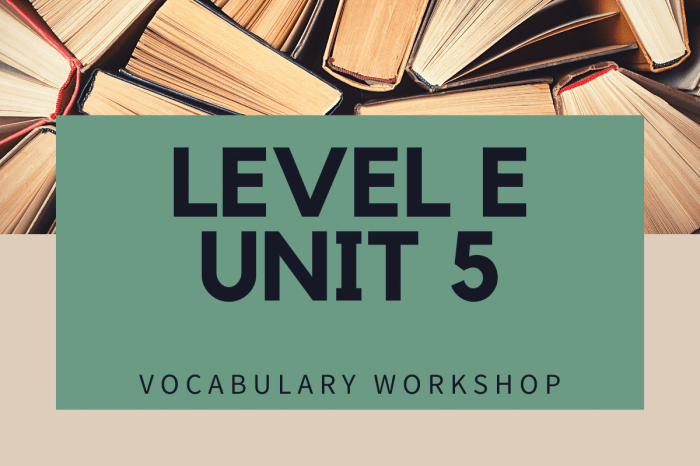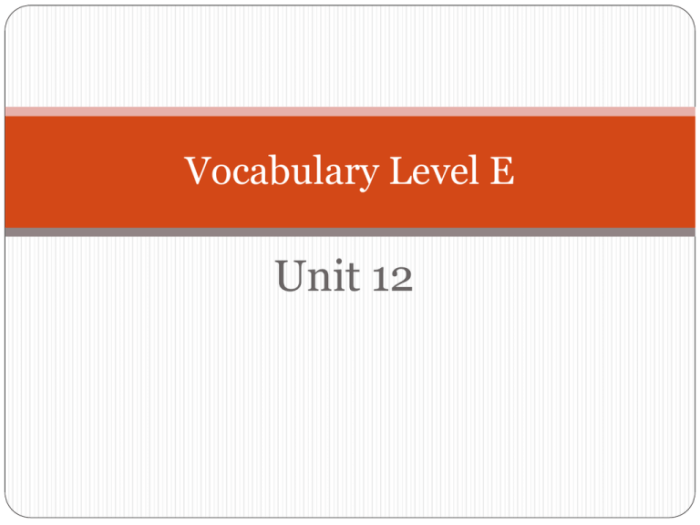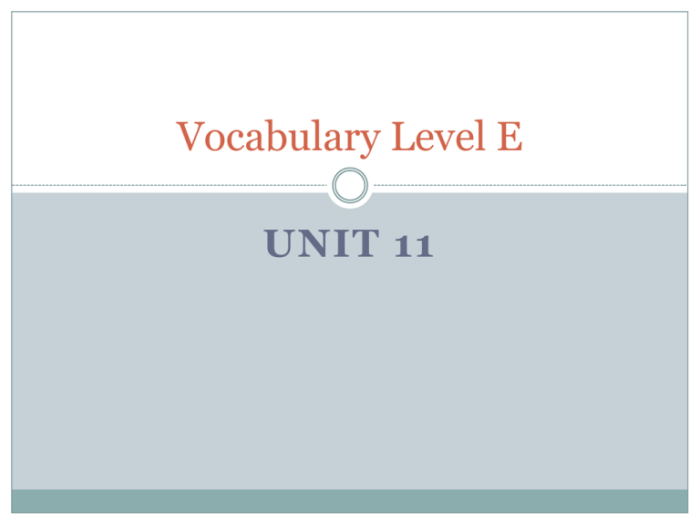Embark on an enriching journey with Vocabulary Level E Unit 5, where you’ll expand your vocabulary, sharpen your communication skills, and elevate your overall language proficiency.
This unit is meticulously designed to cater to individuals seeking to enhance their vocabulary knowledge, encompassing a wide range of themes and topics, from essential everyday words to sophisticated academic terms.
Vocabulary Level E Unit 5

Vocabulary Level E Unit 5 focuses on expanding the vocabulary of learners who have already acquired a strong foundation in English. This unit is designed to enhance their ability to communicate effectively in academic and professional settings, where precise and sophisticated language use is essential.
The target audience for this unit comprises individuals who have reached an intermediate to advanced level of English proficiency. These learners are expected to possess a comprehensive understanding of basic vocabulary and grammar, and are eager to elevate their vocabulary to the next level.
Key Themes and Topics
Vocabulary Level E Unit 5 delves into a range of key themes and topics that are prevalent in academic and professional contexts. These include:
- Academic Discourse:Learners will explore vocabulary related to research, analysis, and critical thinking, enabling them to engage effectively in academic discussions and written assignments.
- Professional Communication:The unit covers vocabulary essential for effective communication in professional settings, including business meetings, presentations, and negotiations.
- Specialized Fields:Learners will encounter vocabulary specific to various specialized fields, such as science, technology, medicine, and law, equipping them to navigate technical and industry-specific discussions.
Word List and Definitions: Vocabulary Level E Unit 5

Vocabulary Level E Unit 5 introduces a diverse array of words, encompassing various parts of speech and semantic fields. These terms are essential for expanding your vocabulary and enhancing your communication skills.
To facilitate comprehension, we have categorized the words based on their parts of speech or semantic fields. Each word is defined accurately and concisely, utilizing examples and synonyms to reinforce understanding.
Nouns
- Antipathy: A strong dislike or aversion; the opposite of sympathy. Example: The politician faced widespread antipathy due to his controversial policies.
- Enmity: Intense hatred or hostility; animosity. Example: The two families harbored deep enmity that had lasted for generations.
- Apathy: A lack of interest or enthusiasm; indifference. Example: The student displayed apathy towards his studies, resulting in poor grades.
- Empathy: The ability to understand and share the feelings of another person. Example: The therapist showed empathy for her client, creating a safe and supportive environment.
Verbs
- Disparage: To speak or write about someone or something in a negative or disrespectful way; to belittle. Example: The critic disparaged the author’s work, claiming it lacked originality.
- Exacerbate: To make a problem or situation worse; to intensify. Example: The heavy rainfall exacerbated the flooding, causing widespread damage.
- Emulate: To imitate or copy someone or something, especially in order to achieve a desired outcome. Example: The young entrepreneur emulated his successful mentor, hoping to replicate his achievements.
- Emphasize: To give special importance or prominence to something; to highlight. Example: The teacher emphasized the key points of the lesson, ensuring that the students understood the most important concepts.
Adjectives
- Antithetical: Completely opposite or contrasting; incompatible. Example: The antithetical views of the two candidates made it difficult to reach a consensus.
- Enigmatic: Mysterious or puzzling; difficult to understand. Example: The enigmatic smile on the Mona Lisa has captivated art enthusiasts for centuries.
- Apathetic: Lacking interest or enthusiasm; indifferent. Example: The apathetic students showed little motivation to participate in class discussions.
- Empathetic: Capable of understanding and sharing the feelings of another person. Example: The empathetic nurse provided comfort and support to her patients.
Contextual Usage and Practice

To solidify your grasp of the vocabulary, we will delve into its practical application through engaging exercises and interactive activities. This will not only reinforce your understanding but also equip you with the confidence to employ these words effectively in various contexts.
Let’s embark on this journey of contextual usage and practice, ensuring that these vocabulary words become an integral part of your linguistic repertoire.
Example Sentences
- Abrogate: The government decided to abrogate the treaty, effectively terminating its obligations under the agreement.
- Coercion: The police used coercion to extract a confession from the suspect, raising concerns about the validity of the statement.
- Diligent: The student’s diligent efforts in studying paid off when they achieved top marks in the exam.
- Ephemeral: The beauty of the sunset was ephemeral, fading away as quickly as it had appeared.
- Fortuitous: It was a fortuitous encounter that led to the two friends reconnecting after many years.
Interactive Exercises
Fill-in-the-Blank
Complete the following sentences by choosing the most appropriate vocabulary word from the list provided:
- The government’s decision to ________ the treaty sparked widespread protests.
- The police were accused of using ________ to obtain a confession from the suspect.
- The student’s ________ efforts in preparing for the exam were evident in their exceptional performance.
- The ________ nature of the flowers made them a popular choice for wedding bouquets.
- It was a ________ meeting that brought the long-lost friends together again.
Answer Key:
- abrogate
- coercion
- diligent
- ephemeral
- fortuitous
Matching Game
Match the vocabulary words with their correct definitions:
- Abrogate
- Coercion
- Diligent
- Ephemeral
- Fortuitous
- Temporary or short-lived
- Lucky or happening by chance
- To cancel or annul formally
- Characterized by hard work and effort
- The use of force or threats to make someone do something
Answer Key:
The vocabulary level e unit 5 is very important for students to master. By understanding the meanings of these words, students will be able to communicate more effectively. To test your understanding of the vocabulary level e unit 5, you can take the red flag green flag quiz . This quiz will help you identify the words that you need to focus on.
- Abrogate
To cancel or annul formally
- Coercion
The use of force or threats to make someone do something
- Diligent
Characterized by hard work and effort
- Ephemeral
Temporary or short-lived
- Fortuitous
Lucky or happening by chance
Vocabulary Building Strategies

Expanding your vocabulary is crucial for effective communication and academic success. Here are some proven strategies to enhance your word power:
Context Clues
Context clues are hints within the text that help you decipher unfamiliar words. Look for synonyms, antonyms, examples, or definitions nearby. For instance, if you encounter the word “perspicacious,” the sentence might mention “sharp-witted” or “observant,” giving you clues to its meaning.
Root Words, Prefixes, and Suffixes
Understanding root words, prefixes, and suffixes can unlock the meanings of many words. A root word is the core meaning, while prefixes and suffixes modify that meaning. For example, the root “chron” means “time,” so “chronology” refers to the study of time and “chronometer” is a time-keeping device.
Reading Widely, Vocabulary level e unit 5
Exposing yourself to a variety of texts, from newspapers to novels, broadens your vocabulary. Read actively, paying attention to unfamiliar words and using context clues to infer their meanings. Make a note of new words and review them later.
Vocabulary Flashcards or Study Tools
Flashcards are a classic tool for memorizing vocabulary. Write the word on one side and its definition, synonyms, or usage examples on the other. Review them regularly to reinforce your memory. Other study tools, such as online vocabulary games or apps, can also be helpful.
Assessment and Evaluation

Assessing and evaluating students’ vocabulary knowledge is crucial to monitor their progress and identify areas for improvement. Various methods can be employed to assess vocabulary, including quizzes, essays, and vocabulary logs.
Quizzes
Quizzes are a common method for assessing vocabulary knowledge. They can be administered in various formats, such as multiple-choice, fill-in-the-blank, or matching exercises. Quizzes allow teachers to quickly assess students’ understanding of new vocabulary and identify areas where further instruction is needed.
Essays
Essays provide students with an opportunity to demonstrate their vocabulary knowledge in a more comprehensive manner. Students can be asked to write essays on topics related to the vocabulary they have learned, using the new words correctly and effectively. Essays allow teachers to assess students’ understanding of the meaning and usage of words in context.
Vocabulary Logs
Vocabulary logs are a useful tool for students to track their vocabulary learning. Students can record new words they encounter in their reading or writing, along with their definitions and examples of usage. Vocabulary logs help students to actively engage with new words and reinforce their learning.
Technology in Vocabulary Assessment and Tracking
Technology can be a valuable tool in vocabulary assessment and tracking. Online quizzes and exercises can provide students with immediate feedback on their progress. Vocabulary-tracking apps can help students to review and practice new words on a regular basis. Technology can also be used to create personalized vocabulary lists and track students’ progress over time.
User Queries
What is the target audience for Vocabulary Level E Unit 5?
This unit is designed for individuals seeking to enhance their vocabulary knowledge, regardless of their current proficiency level.
How can I effectively practice the vocabulary words?
Engage in interactive exercises, create sentences using the words, and immerse yourself in reading materials to reinforce your understanding.
What strategies are included for vocabulary building?
The unit provides techniques such as context clues, root words, prefixes/suffixes, and exposure to diverse texts.
